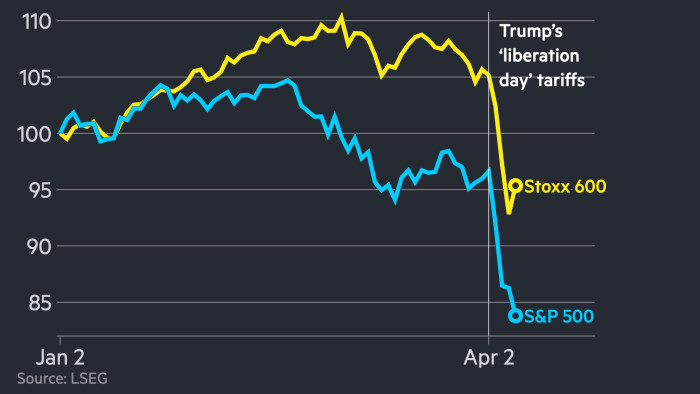US stocks closed sharply lower, reversing an early rally after the White House said Donald Trump would push forward with his threat to hit China with duties exceeding 100 per cent.
The benchmark S&P 500 index closed down 1.6 per cent, a significant pull back from a gain of as much as 4.1 per cent earlier in the trading day. The Nasdaq Composite lost more than 2 per cent.
Tuesday’s swings were the latest bout of turbulence in US stocks after Trump last week announced a plan to impose steep tariffs on dozens of countries, threatening to ignite an all-out trade war.
The White House said on Tuesday that additional 50 per cent tariffs on Chinese goods would go into effect on Wednesday just after midnight in Washington. That would come on top of “reciprocal” measures announced last week, and other levies, bringing the total duties above 104 per cent.
Earlier on Tuesday, the White House had signalled an increased willingness to negotiate with US trading partners over reducing their levies, but there were mixed signals as the day went on.
Washington agreed to open talks with Japan, with US Treasury secretary Scott Bessent saying on Monday that Tokyo “would get top priority as they came forward very quickly”.
Trump posted on his Truth Social platform that he had also spoken to the acting president of South Korea, adding that “we have the confines and probability of a great DEAL for both countries”.
By contrast, tensions between the US and China ratcheted up on Tuesday as Beijing vowed to “fight to the end” if the US pressed ahead with steep tariffs on the country.
A day earlier, Trump threatened to hit China with a 50 per cent additional tariff, after Beijing last week said it would match his “reciprocal” duty of 34 per cent.
The region-wide Stoxx Europe 600, the FTSE 100 and Germany’s Dax were all up about 2.3 per cent on Tuesday.
In currency markets, the US dollar was down 0.3 per cent against a basket of trading partners.
Oil prices fell, with the international benchmark Brent trading down 3.8 per cent to below $62 a barrel in the New York afternoon, while WTI, the US marker, dropped 3.7 per cent to $58.46 a barrel.
US oil prices are now below the level many American producers need to break even on their wells.






